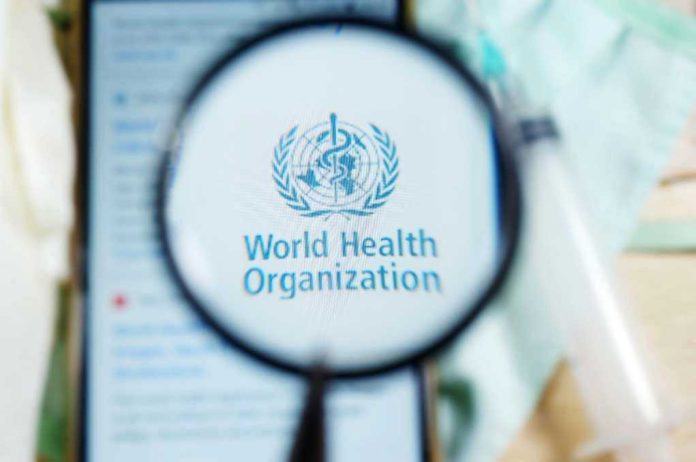
America’s health care system has been quietly steered for decades by unelected global bureaucrats—now, with President Trump’s move to withdraw from the World Health Organization, the curtain is finally being yanked back on the real power brokers behind our medical system.
At a Glance
- The U.S. has officially notified the WHO of its withdrawal, set to finalize in January 2026.
- Current health care coding standards, built on WHO’s ICD system, are under scrutiny for stifling innovation and patient access.
- Medical and political leaders are fiercely debating whether to replace or reform the global coding framework for a more American-centered approach.
- The move has ignited heated discourse over national sovereignty, patient care, and the future of global health cooperation.
America Finally Pushes Back on the WHO’s Secret Rulebook
For more than 75 years, U.S. doctors, hospitals, and insurance companies have been forced to operate under rules crafted not in Washington, D.C., but in Geneva, Switzerland. The World Health Organization’s International Classification of Diseases—ICD, for short—has dictated how every diagnosis, treatment, and procedure is coded and reimbursed. This isn’t just some obscure administrative tool; it is the DNA of American health care billing, insurance approvals, and even the data used to justify ever-expanding government health programs. And yet, the ICD is a product of global consensus, not U.S. innovation or patient need—a fact that’s fueled frustration among those who actually deliver and receive care here at home. For years, critics have warned that the ICD system is slow, outdated, and hostile to advances in areas like restorative reproductive medicine, where new treatments are left out in the cold because the WHO’s committee hasn’t gotten around to updating their codes.
On January 20, 2025, President Trump signed an executive order ending the U.S. relationship with the WHO and triggering a one-year countdown to complete withdrawal. This wasn’t just about COVID, or China, or global politics. This was a shot across the bow of unaccountable, international control over the most intimate decisions in American life: how doctors can treat patients, what gets covered by insurance, and which new medical breakthroughs are allowed into the system. For once, the White House is saying enough is enough—the health of American citizens should not be at the mercy of international committees, especially those whose priorities seem increasingly political and detached from reality.
Debate Explodes Over the Future of American Health Coding
What happens next is anything but settled. The ICD codebook is so deeply embedded in our health system’s guts that even a minor change can cause chaos. Hospitals, insurers, and government programs all rely on these codes to function, and nobody wants to see a repeat of the disastrous Obamacare rollout—especially when it comes to something as fundamental as how care is delivered and paid for. Yet the calls for a new, American-made coding system are growing louder, with advocates insisting that the time has come to break free from the bureaucratic inertia of Geneva. Medical innovators complain that the current codes ignore new treatments, especially in reproductive health, stifling progress and keeping patients from accessing the care they need. Health insurers, ever the gatekeepers, warn that any transition must be managed with surgical precision to avoid confusion and denied claims.
Meanwhile, the WHO is ramping up its own global initiatives, touting its 2025 Health Emergency Appeal and warning that America risks becoming isolated from the rest of the world on everything from pandemic response to research collaboration. The White House, for its part, remains unmoved, blasting the WHO for putting politics over science and failing to deliver accountability to member nations. The administration’s allies point to years of frustration with the slow, opaque process of updating ICD codes—and the way that process has punished American patients and providers alike.
Sovereignty, Innovation, and the Road Ahead
It’s no exaggeration to say that this fight is about more than just insurance codes. It’s about who decides what’s medically necessary, which new treatments get a fair shot, and whether American ingenuity can finally be unleashed from the dead hand of international bureaucracy. Some experts warn that a hasty split from the ICD framework could disrupt care, confuse insurers, and make it harder for researchers to compare health data across borders. Others argue that the risk is worth it: only by taking back control can the U.S. build a system that puts patients and doctors—not bureaucrats—in charge of medical decisions.
The path forward is loaded with political and economic landmines. Creating a new coding system from scratch would require massive investment in health IT, retraining for every provider in the country, and a delicate balancing act to ensure compatibility with international partners. But for millions of Americans fed up with the sense that our health care system is being run by faceless global technocrats, the promise of restoring national sovereignty—and unleashing real medical innovation—may finally outweigh the risks. The WHO’s grip on American health care is loosening, and the next chapter in this fight promises to be even more consequential.




![Shocking Bot Advice: Kids in Danger [NEW RESEARCH] When the Chatbot is the Predator (Mini](https://republicannews.org/wp-content/uploads/sites/11/2026/02/NEW-RESEARCH-When-the-Chatbot-is-the-Predator-Mini-218x150.jpeg)


